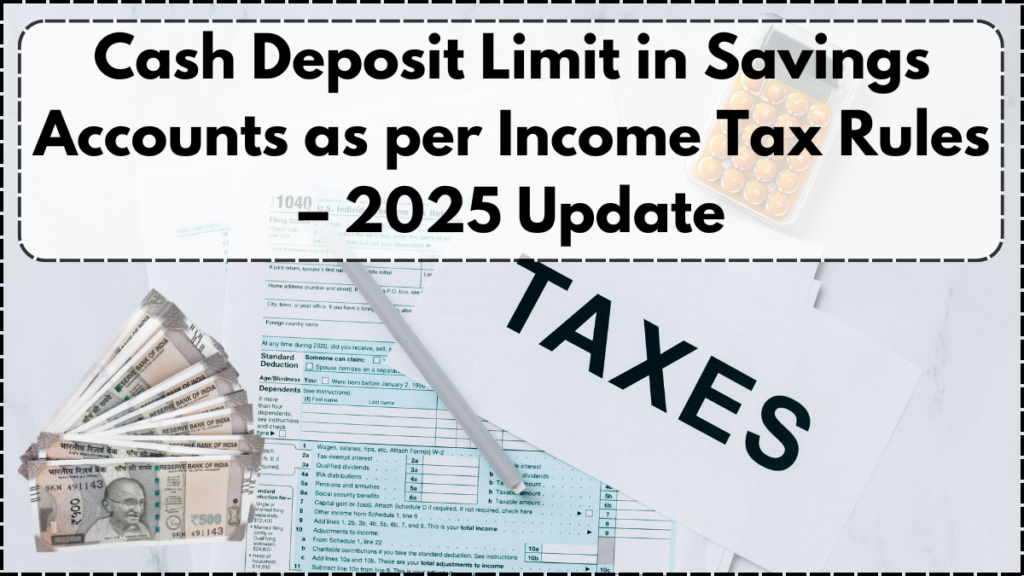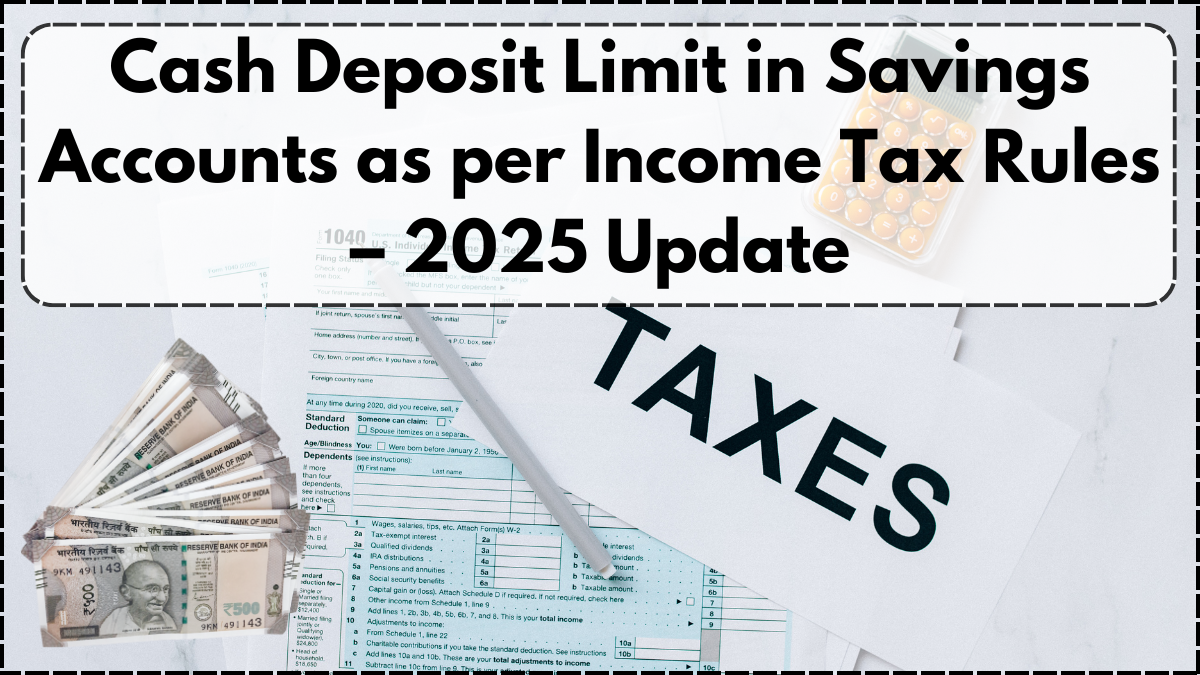In India, the cash deposit limit in savings accounts is governed by various provisions under the Income Tax Act. These limits are designed to monitor the flow of cash transactions and ensure transparency in the banking system, helping prevent activities like money laundering and tax evasion. Understanding these cash deposit limits is crucial for individuals and businesses alike, ensuring compliance with tax regulations.

Cash Deposit Limits for Savings Accounts
As per the provisions in the Income Tax Act of 1961, deposits made into a savings account are closely monitored by financial institutions. If an individual deposits INR 10 lakh or more in cash during a fiscal year, they are required to notify the tax authorities. This threshold helps track high-value transactions that might signal illicit financial activities. For businesses holding current accounts, the reporting limit is significantly higher, at INR 50 lakh.
It is important to note that while these deposits are not directly taxed, they are subject to scrutiny. Banks are required to report any large cash deposits to the Income Tax Department to ensure there is no potential tax evasion.
Cash Deposit Limit for Business Accounts
For businesses, the cash deposit limit varies depending on the nature and scale of the business. Typically, businesses engage in higher volumes of cash transactions compared to individual savings account holders. Therefore, the limit for cash deposits in current accounts is often higher. For instance, State Bank of India (SBI) allows monthly deposits ranging from INR 5 lakh to INR 100 crore in current accounts, while HDFC Bank imposes a cash deposit limit of INR 60 lakh, or ten times the monthly average balance.
Key Regulations Under Section 194N of the Income Tax Act
Section 194N of the Income Tax Act regulates the tax deducted at source (TDS) for cash withdrawals. If an individual withdraws more than INR 1 crore in a financial year, a 2% TDS will be deducted. For those who have not filed their income tax returns for the past three years, the TDS increases. Withdrawals exceeding INR 20 lakh but not exceeding INR 1 crore will incur a 2% TDS, while withdrawals above INR 1 crore are subject to a 5% TDS. The deducted amount is not considered income but can be used as a credit when filing income tax returns (ITR).
Impact of Section 269ST on Cash Transactions
Section 269ST imposes a penalty for individuals who receive INR 2 lakh or more in cash within a particular transaction or during a financial year. This is done to curb large-scale cash transactions that might otherwise be used for money laundering or tax avoidance. However, this regulation does not apply to cash withdrawals, as those are subject to the TDS regulations mentioned above.
Regulations for Cash Loans Under Sections 269SS and 269T
Sections 269SS and 269T focus on cash loans, particularly the acceptance or repayment of loans in cash. If a loan is taken or repaid in cash exceeding INR 20,000 in a financial year, the person involved may face penalties equivalent to the loan amount. This provision aims to reduce the risks associated with unaccounted cash flow in financial transactions.
Tax Implications for Large Cash Deposits
When depositing large sums of cash, it is essential to understand that while these deposits are not immediately taxed, they must be justifiable. The tax authorities require individuals to authenticate the source of their income if large cash deposits are made into a bank account. If the source of income cannot be substantiated, the income will be subject to a 60% tax, along with a 25% surcharge and a 4% cess, as per Section 68 of the Income Tax Act.
Cash Transaction Limits in Various Sectors
Cash Transaction Limit in Savings Accounts
For personal savings accounts, a cash transaction limit exists to ensure that large, unreported transactions are not carried out. If a cash deposit exceeds INR 10 lakh in a fiscal year, it must be reported. Cash transactions are further regulated by Section 269ST, where no transaction above INR 2 lakh is allowed in a day.
Cash Withdrawal Limits
The limits for cash withdrawals are also regulated under the Income Tax Act. In general, while banks impose their own withdrawal limits, any withdrawal exceeding INR 1 crore within a year is subject to a 2% TDS. However, individuals with multiple bank accounts can avoid TDS on large withdrawals by splitting the amount across different accounts.
Cash Gift Limit
India’s Income Tax Act has specific guidelines on cash gifts. Cash gifts received within the limit of INR 50,000 in a single year are exempt from tax. Gifts from immediate family members, including parents, siblings, or in-laws, are not taxable regardless of their value. However, gifts from non-relatives exceeding INR 50,000 are taxable.
Fixed Deposit and Credit Card Bill Payment Limits
Certain deposit limits also apply to fixed deposits. For tax-saving fixed deposits, individuals can invest up to INR 1.5 lakh per financial year. Similarly, cash payments for credit card bills are subject to limits, with most banks allowing payments up to INR 50,000 per day.
Real Estate Transaction Regulations
The government also regulates cash transactions in real estate to combat the black money market. As per the rules, cash transactions for property purchases exceeding INR 20,000 are prohibited. Section 269SS imposes a penalty for cash payments exceeding this amount.
Conclusion: Staying Compliant with Tax Regulations
Adhering to cash deposit limits and understanding the tax regulations related to financial transactions is essential for both individuals and businesses. By staying informed about the latest income tax provisions and compliance requirements, taxpayers can avoid legal issues and contribute to a more transparent financial ecosystem.
FAQ
What is the cash deposit limit for a savings account in India?
According to the Income Tax Act, if you deposit INR 10 lakh or more in cash into a savings account within a fiscal year, it must be reported to the tax authorities.
Are cash deposits in savings accounts taxed directly?
No, cash deposits themselves are not taxed immediately. However, transactions exceeding certain limits must be reported to the Income Tax Department for scrutiny.
What is Section 194N regarding cash withdrawals?
Section 194N mandates a 2% TDS for withdrawals over INR 1 crore within a fiscal year. The TDS increases for individuals who have not filed their income tax returns for the past three years.
How much cash can I gift without tax implications?
You can receive cash gifts of up to INR 50,000 in a year without being taxed. Gifts from immediate relatives are always exempt from tax, regardless of the amount.
What happens if I withdraw large amounts of cash?
Withdrawals exceeding INR 1 crore within a year are subject to 2% TDS. Withdrawals over INR 20 lakh by those who haven’t filed tax returns will attract a 5% TDS.
For More Information Click Here
Pari is a passionate writer known for captivating stories that blend imagination and reality. Inspired by travel, history, and everyday moments, Pari crafts narratives that resonate deeply with readers.




